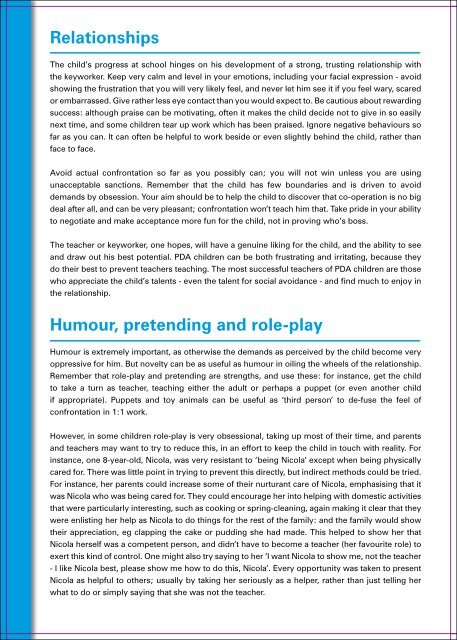PDA_Booklet
PDA_Booklet
PDA_Booklet
Create successful ePaper yourself
Turn your PDF publications into a flip-book with our unique Google optimized e-Paper software.
Relationships<br />
The child’s progress at school hinges on his development of a strong, trusting relationship with<br />
the keyworker. Keep very calm and level in your emotions, including your facial expression - avoid<br />
showing the frustration that you will very likely feel, and never let him see it if you feel wary, scared<br />
or embarrassed. Give rather less eye contact than you would expect to. Be cautious about rewarding<br />
success: although praise can be motivating, often it makes the child decide not to give in so easily<br />
next time, and some children tear up work which has been praised. Ignore negative behaviours so<br />
far as you can. It can often be helpful to work beside or even slightly behind the child, rather than<br />
face to face.<br />
Avoid actual confrontation so far as you possibly can; you will not win unless you are using<br />
unacceptable sanctions. Remember that the child has few boundaries and is driven to avoid<br />
demands by obsession. Your aim should be to help the child to discover that co-operation is no big<br />
deal after all, and can be very pleasant; confrontation won’t teach him that. Take pride in your ability<br />
to negotiate and make acceptance more fun for the child, not in proving who’s boss.<br />
The teacher or keyworker, one hopes, will have a genuine liking for the child, and the ability to see<br />
and draw out his best potential. <strong>PDA</strong> children can be both frustrating and irritating, because they<br />
do their best to prevent teachers teaching. The most successful teachers of <strong>PDA</strong> children are those<br />
who appreciate the child’s talents - even the talent for social avoidance - and find much to enjoy in<br />
the relationship.<br />
Humour, pretending and role-play<br />
Humour is extremely important, as otherwise the demands as perceived by the child become very<br />
oppressive for him. But novelty can be as useful as humour in oiling the wheels of the relationship.<br />
Remember that role-play and pretending are strengths, and use these: for instance, get the child<br />
to take a turn as teacher, teaching either the adult or perhaps a puppet (or even another child<br />
if appropriate). Puppets and toy animals can be useful as ‘third person’ to de-fuse the feel of<br />
confrontation in 1:1 work.<br />
However, in some children role-play is very obsessional, taking up most of their time, and parents<br />
and teachers may want to try to reduce this, in an effort to keep the child in touch with reality. For<br />
instance, one 8-year-old, Nicola, was very resistant to ‘being Nicola’ except when being physically<br />
cared for. There was little point in trying to prevent this directly, but indirect methods could be tried.<br />
For instance, her parents could increase some of their nurturant care of Nicola, emphasising that it<br />
was Nicola who was being cared for. They could encourage her into helping with domestic activities<br />
that were particularly interesting, such as cooking or spring-cleaning, again making it clear that they<br />
were enlisting her help as Nicola to do things for the rest of the family: and the family would show<br />
their appreciation, eg clapping the cake or pudding she had made. This helped to show her that<br />
Nicola herself was a competent person, and didn’t have to become a teacher (her favourite role) to<br />
exert this kind of control. One might also try saying to her ‘I want Nicola to show me, not the teacher<br />
- I like Nicola best, please show me how to do this, Nicola’. Every opportunity was taken to present<br />
Nicola as helpful to others; usually by taking her seriously as a helper, rather than just telling her<br />
what to do or simply saying that she was not the teacher.


